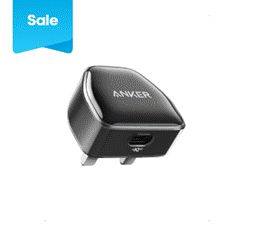Charging your phone seems simple, but doing
it the wrong way can lead to battery damage, overheating, or even fire hazards.
Many users unknowingly use iphone charger
that aren’t built with safety in mind. Whether you're charging overnight or
topping up on the go, knowing the right safety practices is essential. That’s where a reliable solution like the
Anker Nano Charger (20W) comes in—designed with advanced safety and fast-charging tech to protect your
devices while powering them up quickly.
Key Charger Safety Practices to Protect Your
Device
Always Use Certified and Trusted Chargers
Cheap or counterfeit chargers often lack
the safety features that protect your phone’s battery and internal components. These chargers may overheat,
deliver unstable voltage, or lack the ability to shut off when the device is
fully charged. Over time, that can degrade battery life or even create fire
risks. The Anker Nano Charger (20W) is designed for safety and reliability.
Backed by ActiveShield™ 2.0 technology, it monitors temperature in real time and adjusts
power delivery through a Power Tuner Chip. This ensures your device receives
optimal current without the risks of overheating or overcharging. Before
plugging in any new charger, check for certifications like CE, FCC, or RoHS,
and always buy from reputable brands. A small price difference could protect
your phone—and your safety—in the long run.

Avoid Charging in Extreme Temperatures
Your charger and phone perform best at
moderate temperatures. Charging in a hot car, direct sunlight, or near
heat-producing appliances can cause overheating. Cold environments aren’t ideal either, as they slow down
chemical reactions in the battery. To stay safe, charge your device in a cool,
dry place. The Anker Nano Charger has a Dynamic Temperature Sensor that helps
regulate internal heat, making it safer to use even in warmer climates.
However, it’s always smart to keep your phone out of extreme environments while
charging. Also, if your phone feels unusually warm during charging, disconnect
it and let it cool before resuming.
Don’t Use Damaged Cables or Plugs
Frayed wires, loose connectors, and bent
pins are all signs it’s time to replace your cable. Damaged cables can cause electric
sparks, short circuits, or inconsistent charging. Even if your charger is
top-tier, pairing it with a faulty cable defeats its built-in safety systems. The
Anker Nano Charger pairs best with high-quality USB-C to Lightning or USB-C
cables. While the charger does not include a cable, using a certified cable
ensures consistent, safe power delivery. Keep an eye out for Apple MFi or USB-IF
certifications when choosing a compatible cord. It’s also important to avoid yanking the
cable from the wall or the phone—always remove it by holding the connector, not the wire.
Compact and Travel-Friendly
Traveling with bulky chargers is
inconvenient. The Anker Nano is 45% smaller than a standard 20W adapter, but
just as powerful. It fits in any bag, pocket, or outlet space with ease, making
it perfect for home, office, or on-the-go use. Its sleek design reduces clutter
and makes charging easier in tight spaces. Whether you’re at the airport or a café, the compact size delivers fast, safe
charging without taking up space.

Conclusion
Charger safety is about more than just
getting power to your device—it’s about protecting your phone, your data, and your home. Skipping on
quality or ignoring basic precautions can lead to real risks. The Anker Nano
Charger (20W) delivers high-speed charging, advanced protection, and compact
convenience. With ActiveShield™ 2.0, GaNPrime™ efficiency, and real-time temperature monitoring, it stands out as
a safe, smart, and sustainable option.
